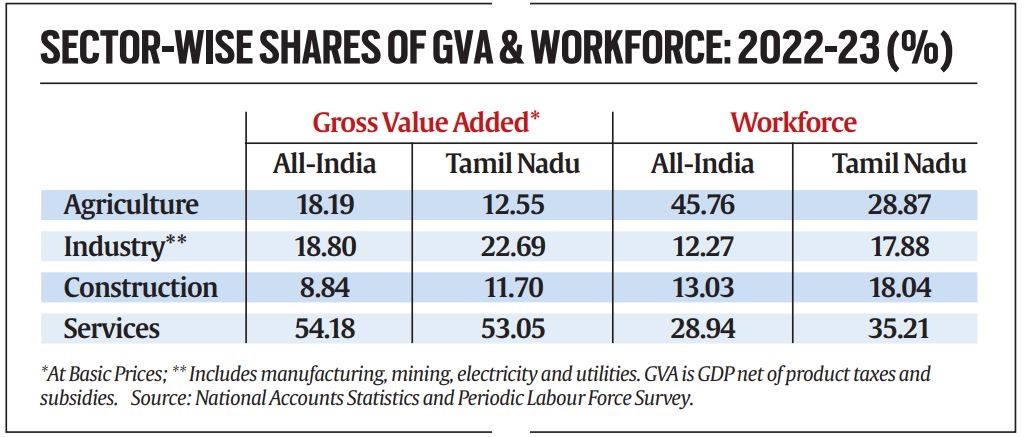Description

Disclaimer: Copyright infringement not intended.
Context
- Tamil Nadu, stands as India’s leading state in economic complexity, evidenced by the diversity within its gross domestic product (GDP) and employment landscape.
Sector-wise Analysis
- The table delineates the sectoral contributions to Tamil Nadu's Gross Value Added (GVA) and its employed labor force.
- Notably, the state displays a diminished reliance on agriculture compared to the national average, with higher proportions allocated to industry, services, and construction sectors. This exhibits: decentralized industrialisation model.

Industrial Comparison with Gujarat
- Despite Gujarat's industrial prowess surpassing that of Tamil Nadu, with the former's factory sector contributing 43.4% of its GVA and engaging 24.6% of its workforce, Tamil Nadu's economy exhibits greater balance and diversification.
- While agriculture plays a significant role in both states, Tamil Nadu demonstrates a lower dependence, contributing to a more varied economic landscape.
Agricultural Complexity
- Agriculture serves as another indicator of Tamil Nadu's economic complexity. A notable 45.3% of the state's agricultural GVA stems from the livestock subsector, exceeding the national average by a significant margin.
- This prominence in livestock agriculture has fostered the emergence of notable enterprises, consolidating Tamil Nadu's position as a leader in this domain.
Cluster-based Industrialisation in Tamil Nadu
Economic Landscape
- Tamil Nadu boasts a select group of major business entities, although not on par with national giants like Tata or Reliance in terms of turnover.
Medium-scale Enterprises
- The state's economic evolution owes much to medium-scale businesses with turnovers ranging from Rs 100 crore to Rs 5,000 crore, fostering a more distributed and decentralized industrialization model.
Clusters: Key Drivers of Industrial Growth
- Various clusters across Tamil Nadu have emerged as hotspots of industrial activity, each specializing in specific industries, contributing significantly to the state's economic diversity and vitality.
Prominent Clusters:
- Tirupur: Cotton knitwear
- Coimbatore: Spinning mills, engineering goods
- Sivakasi: Safety matches, firecrackers, printing
- Salem, Erode, Karur, Somanur: Powerlooms, home textiles
- Vaniyambadi, Ambur, Ranipet: Leather
Diversification and Employment
- These clusters, often situated in small urban or peri-urban centers, serve as employment hubs, providing livelihoods to locals and reducing reliance on agriculture.
Impact on Employment
- Cluster-based industrialization has significantly impacted employment patterns, offering alternatives to agricultural livelihoods and curbing rural-to-urban migration.
Entrepreneurship Dynamics
- The entrepreneurial landscape in Tamil Nadu reflects a diverse mix of communities and industries, fostering innovation and economic growth across various sectors.
Community-driven Entrepreneurship:
- Kammavar Naidus: Spinning mills, pumps & valves
- Kongu Vellalar or Gounders: Textiles, agriculture
- Nadars: Fireworks, match, and printing industries
Social Progress and Industrial Success
- Tamil Nadu's emphasis on public health and education investments, coupled with a culture of grassroots entrepreneurship, has been instrumental in driving industrialization and diversification beyond agriculture.
IN A NUTSHELL,
Factors that have contributed to Tamil Nadu's comparative success in achieving industrialization and economic diversification beyond agriculture.
- Embrace of Cluster-based Industrialization: Unlike reliance on large corporations, Tamil Nadu's economic transformation primarily stems from medium-sized enterprises, with turnovers ranging from Rs 100 crore to Rs 5,000 crore. This shift towards industrialization has been marked by a decentralized approach, emphasizing the development of industrial clusters. Notable examples include Tirupur for cotton knitwear, Coimbatore for spinning mills and engineering goods, and Sivakasi for safety matches.
- Development of Sub-specialized Clusters: Numerous sub-specialized clusters have emerged in Tamil Nadu's small towns and peri-urban areas, providing employment opportunities for local populations and curbing rural-to-urban migration. These clusters play a crucial role in diversifying job options beyond agriculture, thus reducing the state's dependence on agrarian livelihoods.
- Grassroots Entrepreneurship: The recent wave of decentralized industrialization in Tamil Nadu has been spearheaded by entrepreneurs hailing from ordinary farming backgrounds and local merchant communities. For instance, Coimbatore's spinning mills, foundries, and manufacturing units have predominantly been initiated by Kammavar Naidus, reflecting a grassroots-driven industrial growth model.
- Cultivation of a Diverse Entrepreneurial Culture: Tamil Nadu boasts a diverse entrepreneurial landscape, with participation from various communities across different industries. Examples include the presence of Christians in companies like MRF, Johnson Lifts, and Aachi Masala Foods, and Muslims in ventures such as the Farida Group. This inclusive entrepreneurial culture fosters innovation and contributes to the state's industrial dynamism.
These factors, combined with significant investments in public health and education, elucidate Tamil Nadu's relative success in industrialization and economic diversification away from traditional agricultural pursuits.
|
PRACTICE QUESTION
Q. Which of the following clusters in Tamil Nadu is renowned for its specialization in cotton knitwear?
a) Coimbatore
b) Salem
c) Tirupur
d) Vaniyambadi
Answer c)
PRACTICE QUESTION
Q. Decentralized industrialization has emerged as a notable trend in many regions globally. Discuss the advantages and challenges associated with this approach to industrial development. Provide examples of successful decentralized industrialization models from different parts of the world to support your argument.
|
















